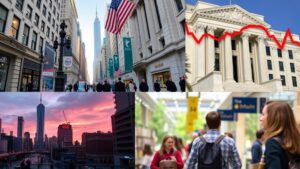The recent court ruling against Trump’s birthright citizenship order has reignited discussions surrounding immigration policies in the United States. As the administration contemplates significant changes, the potential long-term effects on the U.S. economy are becoming increasingly clear. This article explores how these policy shifts could reshape various economic sectors and impact everyday Americans.
Shrinking Workforce and Labor Market Challenges
One of the most immediate consequences of restrictive immigration policies is a shrinking workforce. With plans to deport up to one million undocumented immigrants annually and reduce legal immigration levels, industries that rely heavily on low-wage labor, such as agriculture, hospitality, and construction, may face severe labor shortages.
- Labor Shortages: A decrease in available workers can lead to increased competition for jobs, driving up wages but also potentially leading to higher consumer prices as businesses pass on costs to customers.
- Economic Growth: A smaller labor force can hinder economic growth. Projections suggest that growth could contract by 2.1% in 2026 due to these immigration restrictions, which may stifle overall productivity and output.
Inflationary Pressures and Consumer Prices
As the labor market tightens, inflationary pressures are likely to rise:
- Wage Growth: Increased competition for workers may result in accelerated wage growth, which can contribute to higher consumer prices.
- Tariffs and Costs: Proposed tariffs on imports could further inflate costs for goods and services, leading to sustained inflation levels that exceed the Federal Reserve’s targets.
Trade Relations and Supply Chain Disruptions
The anticipated shift toward protectionist trade policies under the Trump administration could have far-reaching implications:
- Global Supply Chains: Disruptions in global supply chains may arise from tariffs and trade hostilities, particularly with major partners like China. This could increase costs for U.S. businesses and consumers alike.
- International Impact: The interconnectedness of the U.S. economy with global markets means that adverse effects from domestic policy changes could resonate internationally, potentially leading to a broader economic slowdown.
Income Inequality and Fiscal Health
Changes in immigration policy may also exacerbate income inequality:
- Widening Income Gap: Tax policies favoring corporations and high-income earners could further widen the income gap, leading to increased social tensions as lower-income households struggle with rising living costs.
- Federal Deficit Concerns: Proposed tax cuts combined with reduced federal spending on social programs may lead to a significant increase in the federal deficit. This financial strain could limit government capacity to invest in infrastructure or social services critical for long-term economic stability.
Navigating Economic Uncertainty
The implications of recent immigration policy changes are profound, potentially reshaping the U.S. economic landscape for years to come. While some sectors may experience short-term gains, the risks introduced by restrictive immigration policies, protectionist trade measures, and deregulation could undermine broader economic stability and growth.
Key Takeaways
- A shrinking workforce may lead to labor shortages in key sectors.
- Economic growth is projected to slow while inflation rises.
- Consumer prices are likely to increase due to tariffs and wage growth.
- Income inequality may widen due to tax policy shifts.
- Long-term fiscal challenges could arise from increased deficits.
FAQ
Q. How will immigration policy changes affect job availability?
A. Restrictive policies may lead to labor shortages in industries that rely on immigrant workers, affecting job availability and competition.
Q. What inflationary effects can we expect?
A. Higher consumer prices are likely as wage growth accelerates alongside potential tariffs on imports.
Q. How might these policies influence global trade dynamics?
A. Protectionist measures could disrupt supply chains and strain international trade relations, impacting both domestic and global economic stability.
In summary, as policymakers navigate this complex landscape, it will be essential to consider both immediate impacts and long-term consequences for the economy as a whole. The future of U.S. immigration policy will undoubtedly shape not only the lives of millions but also the economic trajectory of the nation itself.










